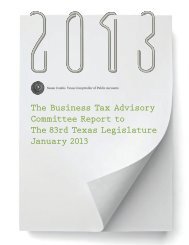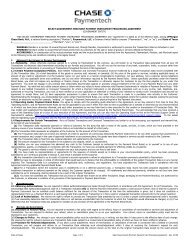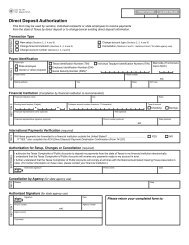Contracts Management Guide - Texas Comptroller of Public Accounts
Contracts Management Guide - Texas Comptroller of Public Accounts
Contracts Management Guide - Texas Comptroller of Public Accounts
Create successful ePaper yourself
Turn your PDF publications into a flip-book with our unique Google optimized e-Paper software.
criteria should allow the evaluation team to fairly evaluate the proposals. The evaluation criteria may take a variety <strong>of</strong><br />
sources <strong>of</strong> information into consideration such as the written response, the oral presentation, documented past<br />
performance <strong>of</strong> the respondents and references relevant to the contract. Specific portions <strong>of</strong> the required response<br />
should directly relate to the evaluation criteria.<br />
To ensure fairness in evaluation, the evaluation criteria should reflect only those requirements specified in the<br />
solicitation document. The language within the solicitation will determine the scope <strong>of</strong> the evaluation criteria and the<br />
flexibility the evaluation team will have when evaluating proposals, so the evaluation criteria should not be unduly<br />
restrictive. Respondents must have notice in the solicitation <strong>of</strong> all requirements. The solicitation should clearly state<br />
the consequence <strong>of</strong> failing to meet these requirements such as reduction in evaluation score or disqualification.<br />
Consider carefully any requirements that may disqualify a proposal. For example, the HUB Subcontracting Plan is<br />
required by state statute, therefore, agencies have no choice but to disqualify the respondent if they do not submit the<br />
plan. However, if the respondent fails to submit a copy <strong>of</strong> a license, is that really a valid reason for disqualification?<br />
Criteria that was not included in the solicitation may not be used in the selection or ranking <strong>of</strong> a proposal. For<br />
example, if respondents receive additional points for possessing a national accreditation, or meeting the unique needs<br />
<strong>of</strong> the customers, these criteria must be included in the solicitation so that the respondents know there is an<br />
opportunity to score higher by providing these options. Likewise, if this information is not requested in the<br />
solicitation, respondents who fail to <strong>of</strong>fer these options cannot be penalized.<br />
There are several schools <strong>of</strong> thought on how much information is provided to the respondents regarding the<br />
evaluation criteria. At a minimum, the criteria must include the weight assigned to each criterion. Some agencies<br />
prefer to give more detailed information as to how each criterion is broken down into smaller units or they include a<br />
copy <strong>of</strong> the evaluation scoring sheets with the solicitation. Either approach is acceptable.<br />
When determining the evaluation criteria, also consider the proposal submission requirements associated with each<br />
criteria. In the sample criteria listed below, methodology is a criterion on which the respondents will be evaluated.<br />
What information needs to be included in the response in order to effectively evaluate a respondent’s methodology –<br />
did they copy a project management technique straight from a training manual, or did they tailor this technique<br />
specifically to meet the needs <strong>of</strong> the solicitation? Another example is experience, skills and qualifications <strong>of</strong> company<br />
and staff. What information is required for the evaluation team to score this criterion – years in business, years <strong>of</strong> staff<br />
experience, certified or licensed employees, performing similar size projects, etc? The table below indicates sample<br />
evaluation criteria:<br />
SAMPLE EVALUATION<br />
CRITERIA<br />
34<br />
SAMPLE WEIGHT<br />
Cost 60%<br />
Proposed services, including work plan<br />
and methodology.<br />
Experience, skills and qualifications <strong>of</strong><br />
company & staff.<br />
Cost is typically the most significant evaluation factor. However, there are procurements in which the skills and<br />
experience <strong>of</strong> the contractor or other factors may be more important than cost. For example, if a trainer has to have a<br />
specific set <strong>of</strong> skills, the agency may be willing to pay more for these skills. When establishing the criteria weight,<br />
consider the importance <strong>of</strong> the criteria to the overall project. The criteria deemed most important by the agency<br />
should be weighted higher than the other criteria. The following diagram demonstrates the relationship <strong>of</strong> the<br />
evaluation criteria and the level <strong>of</strong> importance.<br />
20%<br />
20%

















